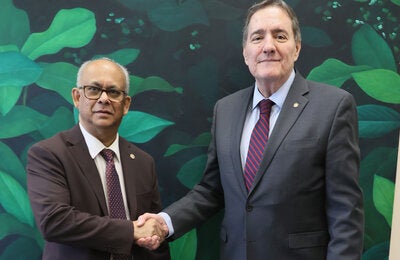
Washington DC, 24 May 2021 (PAHO)- On 28 April, the International Chamber of Commerce, together with the Trinidad and Tobago Chamber, CARICHAM, and the CARICOM Private Sector Organization, hosted a webinar on “The role of the private sector in the vaccination rollout process”. The goal of this activity was to provide the private sector community in CARICOM with insight into multilateral efforts on vaccine distribution and rollout, learn about regional issues with respect to pandemic containment, and provide actionable steps to enable the private sector to safely reopen and help in reducing vaccine hesitancy.
Participants discussed actions needed from businesses and governments to end the pandemic in the Caribbean. James Fitzgerald, PAHO/WHO Director, Health Systems and Services, presented on “What can be done to reopen now? Addressing the need for safer spaces”.
The development of COVID-19 vaccines represents a great opportunity in the fight against COVID-19. The number of doses available now and in the mid-term, however, will not achieve population immunity. As such, the primary approach to vaccination is aimed at saving lives and maintaining the functioning of frontline health services and, in some countries, essential services in general. In the Caribbean, the majority of countries have started vaccination but only in small and priority populations.
“The return to "normalcy" of daily life is not contemplated in the short term,” said James Fitzgerald. “In view of this, maintaining non-pharmacological public health measures, use of mask, hand hygiene, physical distance, and ventilating closed spaces when possible, remains critical to control this pandemic.”
From the outset of the pandemic PAHO and WHO have been working to ensure equity in access to vaccines. WHO proposed that protecting individuals and health systems and minimizing the impact on economies should be the driving force behind the allocation of COVID-19 vaccines across different countries. PAHO has delivered more than 12 million COVAX-procured vaccine doses to countries in Latin America and the Caribbean. COVAX is the global alliance for equitable distribution of COVID-19 vaccines. Another 770,000 doses are on the way to Central American and Caribbean countries.
“PAHO will continue to play a critical role in this endeavor, through its Revolving Fund and the cross-cutting technical cooperation is ensuring our countries receive quality, safe and effective vaccines and have all the elements in place to successfully and rapidly deploy these game-changing health technologies,” said James Fitzgerald.
On the issue of vaccine production, Latin America and the Caribbean have not paid sufficient attention to the issue of maintaining its health industry productive base, said Fitzgerald. Few countries produce vaccines with little private sector participation in the Region.
“Policies in science, technology, and innovation have not targeted the health technology sector, and there has been little investment -public and private- in the development of the health technology institutions, and health technology development clusters with the participation of academia and the industry,” said Fitzgerald.
PAHO worked jointly with the Economic Commission for Latin America and the Caribbean (ECLAC) on the report: ‘Health and the Economy: A Convergence Needed to Address COVID-19 and Retake the Path of Sustainable Development in Latin America and the Caribbean’ to ensure that health, science and technology, and the industrial sectors begin to build the necessary capacity for the future. The report recognizes that the structural deficiencies in the health sector are the result of years of inadequate public investment. Over the past decades, public spending in health, while slowly increasing, has been persistently low, and in many cases, totally inadequate, and far from PAHO’s recommended 6% of GDP.
“We must strengthen the interaction and agreements between government, civil society, and the private sector to formulate strategies with all actors and support from broad sectors of society,” said James Fitzgerald.
Health and well-being must be seen as prerequisites for reactivating the economy in the context of COVID-19. Prioritizing health and strengthening health systems based on the primary health care approach, is at the very foundation of our pathway towards recovery.
“Stronger, resilient health systems require countries in our region to increase public investment to achieve a highly resolutive first level of care,” said Fitzgerald. “All of this will require strong political leadership and significant investment to affect change,” he added.



